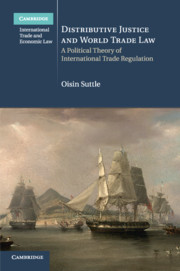Description
Distributive Justice and World Trade Law
A Political Theory of International Trade Regulation
Cambridge International Trade and Economic Law Series
Author: Suttle Oisin
This book proposes a novel theory of justice in international trade law, examining what justice means and demands in this domain.
Language: English
Subject for Distributive Justice and World Trade Law:
Approximative price 40.64 €
In Print (Delivery period: 14 days).
Add to cart
Distributive Justice and World Trade Law
Publication date: 12-2018
Support: Print on demand
Publication date: 12-2018
Support: Print on demand
Approximative price 142.56 €
In Print (Delivery period: 14 days).
Add to cart
Distributive Justice and World Trade Law
Publication date: 10-2017
420 p. · 15.7x23.5 cm · Hardback
Publication date: 10-2017
420 p. · 15.7x23.5 cm · Hardback
Description
/li>Contents
/li>Biography
/li>
What does justice demand in international trade regulation? And how far does World Trade Organization (WTO) law respond to those demands? Whether our focus is developing countries, struggling industries, or environmental protection, distributive conflict is a pervasive feature of international economic law. Despite this, we lack an adequate theory of distributive justice for this domain. Drawing on philosophical approaches to global justice, this book advances a novel theory of justice in trade regulation, and applies this to explain and critique the law of the WTO. Integrating theoretical and doctrinal approaches, it demonstrates the potential for political theory to illuminate and inform the progressive development of WTO law, including rules on border measures, discrimination, trade remedies and domestic regulation. Written from an interdisciplinary perspective, accessible to lawyers, philosophers and political scientists, the book will appeal both to theorists interested in building bridges from theory to practice, and practitioners seeking new perspectives on existing problems.
Part I. Foundations: 1. Introduction; 2. Why World Trade Law needs a theory of justice; Part II. Justice: 3. Towards a political theory of international economic law; 4. Sovereignty, nationality and the limits of statism; 5. Self-determination and external trade measures; Part III. Law: 6. Border measures, discrimination, and ETMs; 7. Justifying ETMs: development provisions and general exceptions; 8. Trade remedies and fairness in international trade regulation; 9. Domestic regulation, self-determination and DEMs; Part IV. Progress: 10. Conclusion: where to from here?
Oisin Suttle is a Lecturer at Queen's University, Belfast, having previously taught at the University of Sheffield and University College London. He teaches political philosophy, public international law and WTO law. He holds degrees in law (University College Dublin) and international relations (University of Oxford), and a Ph.D. on the philosophy of international economic law (University College London). His research has been published in leading international journals, including the European Journal of International Law, the Modern Law Review, and the Journal of International Law and International Relations. He formerly practiced commercial law and is qualified both in Ireland and in England and Wales.
© 2024 LAVOISIER S.A.S.




